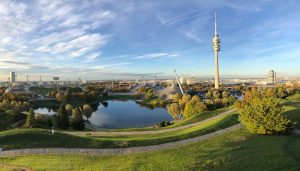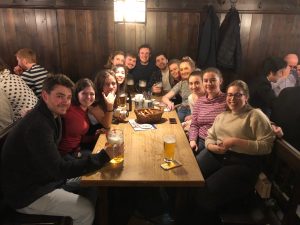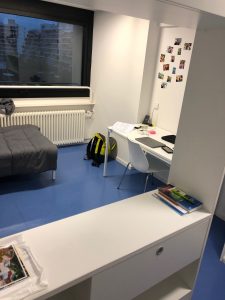Predeparture
My Time at TU, Munich

I applied for my Visa about 4-6 weeks before my departure date. I applied for a Work Visa in order to allow me to complete an internship in Germany before my exchange started. I did a lot of searching on online-internship-listing sites in order to find a company to do an internship at. I spent time working on my CV, researching how to open a bank account in Germany and finding a place to stay.
Once I found a place to do an internship at in Berlin, I started working to find an apartment to stay. I asked the HR department of the company I had been hired by to please send around an internal email letting the employees know that I was looking for a place to stay. Fortunately, somebody at the business had a free apartment during the time of my internship and offered to sublet it to me.
Once I had my internship and accommodation for the first two months sorted out, I could start preparing the necessary documents for my Visa. Such documents included my contract with the company I was going to work for, proof of accommodation, plane tickets, proof of enrollment at Stellenbosch University and more… I would recommend starting sooner rather than later when it comes to preparing for one’s visa application.
The plane tickets served as a challenge, due to the fact that the visa office needs you to have a return ticket, however, I had no idea about when I would need to fly back to South Africa. As a result, I decided to book a flexible ticket which allowed me to reschedule both the date and locations of my flights within one year, while only having to pay the difference if the updates led to an increased cost. This allowed me to book my plane tickets and apply for my visa without having to worry about dates so early on. I would recommend booking your flexible return flight for the latest date which your visa will allow (generally 90 days) in order to afford you more time and flexibility to organize a residency permit when arriving in Germany.
Due to having organized an internship before my semester, I wanted to leave for Germany as early as possible so I could get involved in the company for as long as possible. This was a good idea, however caused quite a bit of stress at the time due to the fact that I left about 2 days after my final exam. When booking flights, I highly recommend searching for alternatives as early as possible. In my experience, both Google Flights and Sky Scanner offer the best services when it comes to comparing flight costs and monitoring price changes. I ended up booking my flight with Emirates, with a day’s layover in Dubai (where I applied for a day visa to explore the city), to Frankfurt Airport.
My Predeparture Tips:
- 1. Book your flights earlier to save money,
- 2. Book flexible flights if necessary,
- 3. Start your visa process in good time.
Experience at the Host University

My time at TU Munich was truly incredible. The beauty of Munich city, central location of the university and the extensive public transport network made every day a joy. I was fortunate enough to be in Munich during an unusually warm winter, meaning that I never had to suffer in insane sub-zero temperatures. Instead, during the coldest time of winter, the average temperature was only around -2 degrees Celsius, which is very manageable with a decent jacket and long pants.
Although I found the university facilities quite underwhelming (keep in mind that it only costs 130 Euro a semester to study there), I was thoroughly please by the fact that all lectures that I took were recorded and could be watched again online at a later date. This provided me with a lot of flexibility and made preparing for exams way easier as I could always revisit a concept. All my lectures were offered in English, which was a huge advantage for me. I also decided to take an intensive German course during my time there, managing to complete both A2.1 and A2.2 while studying in Munich.
I found the level of academic difficulty to be very comparable to Stellenbosch University, however the workload in TUM was much less than what I am used to in Stellies. At TUM, most modules have no projects or semester tests during the semester, but rather only one single multiple-choice exam which counts 100% of your grade. While this does allow more flexibility during the semester, it can lead to a lot of stress if one is not prepared to buckle down and study hard when the exam period comes. TUM offers a wide range of English courses in its Business Administration faculty and is therefore a great international university to attend when it comes to a business focused degree like BCom.
I would recommend taking German to anybody who plans on doing an exchange to Germany. While it was not used in most of my social circles, it helped me when it came to things like doing groceries, applying for permits and dealing with merchants and retailers. Knowing some German puts you at an advantage when dealing with locals as they greatly appreciate it when foreigners take the time to learn about their culture and language. I therefore made a point of always introducing myself in German and speaking German whenever my level of comprehension allowed me to. One time where my German came in good use was when I was stopped by a German border patrol agent when returning from a weekend trip in Austria and I had forgotten my passport in my Munich flat. Being able to explain my predicament, while also showing respect by speaking to him in his native tongue, I was lucky enough to come off with only a 25 Euro fine upon showing the other documents which I did have on me at the time (including a photo of my residency permit).
German came in handy when having lunch at my ‘TUM Buddy’s’ family. I applied to be allocated a ‘TUM Buddy’, which is a TU Munich student which is paired up with you for the purposes of providing you with help and support during your exchange. I would recommend really trying your best to get to know your TUM Buddy and forming a friendship with them, as they will likely be one of the only Germans that you get the chance to regularly interact with. In my experience, getting to know and befriending a German is very rewarding. The Germans that I met were very friendly, always available to help and managed to get me out of difficult situations on multiple occasions during my exchange.
Speaking of difficult situations, prepare yourself for copious amounts of bureaucracy and admin when planning your exchange to Germany!

Return to Stellenbosch
The time to return to Stellenbosch came way sooner than expected. Time really does fly when you are having fun. Upon coming back, the first thing I noticed is how beautiful and modern Stellenbosch’s campus facilities are. We are very lucky to have such a great library, many communal computer facilities we can use, as well as a central and bustling student center such as the Neelsie.
On the flip side, I also realized how warped our perceptions of what ‘normal’ life looks like may be. Driving out of Cape Town Airport and seeing all the informal housing settlements, as well as having to live through load shedding again and having to worry about my safety constantly were rude awakenings when it came to my return. We as South Africans need to realize that these aspects should not just be a part of ‘everyday life’, but rather understood as deep issues within our society and governance. As South Africans, we need to put a lot more pressure on our leaders and each other to improve the safety in and stability of our country – because how we experience daily life should not be accepted as normal or simply ‘part of life’.
All in all, I am happy to back in South Africa where I can see my friends again, reconnect with my family and finish up with my degree. The warm weather and cheaper restaurant prices are always welcome after months of having to convert from the ZAR to the EUR. After such an experience, I can see myself going overseas again. I am exploring the idea of completing my master’s degree overseas in order to improve on my international mindset and further establish a global network of friends and business contacts.
I am incredibly grateful to Stellenbosch University and all its employees and helpers behind the scenes who made it possible for a student like me to undertake such a life changing experience. It is quite something to say that you’ve lived overseas before, and that’s something that I can now say because of Stellenbosch University. If any of you reading this are Stellies students, I highly encourage you to get into contact with the SU International Office and explore what options are available to you!

